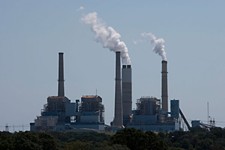Keeping Busy
Former regional EPA head Al Armendariz has a full agenda at the Sierra Club
By Nora Ankrum, Fri., Sept. 14, 2012
(Page 4 of 4)
AC: I should steer the conversation to Austin, because I want to learn about your work now that you're at Beyond Coal. What do you hope to see happen with the city's decision on Fayette?
AA: I'm going to work hard to transition the city of Austin completely away from the Fayette coal-fired power plant. It really is time for the city of Austin, as well as the rest of Texas, to move beyond coal. We produce more wind energy in Texas than the next several states combined. We also have tremendous solar and geothermal resources that are untapped, so we don't need coal to work with abundant and reliable electricity in this state. And my goal is to work with the mayor and City Council, to work with Austin Energy and LCRA [Lower Colorado River Authority], to move the city of Austin as quickly as possible off of coal. And we can do so over a period of years and in a way that creates clean energy jobs, helps expand wind and solar in our state, no longer requires huge amounts of water at a time of drought, and does so in a way that is reliable and doesn't result in rate increases for the people of the city.
AC: And you believe that's possible? That's of course the main controversy that comes up in conversations about Fayette: price versus environment. (See "AE's Coal Conundrum," Nov 20, 2009.)
AA: Absolutely. Coal is getting more expensive, and the price of renewables is falling quickly. There are contracts that the wind energy companies are signing with electric providers across our state which are at or below the cost of providing electricity from fossil fuels like coal, and the price of that renewable energy is dropping. So as we move forward in coming years, I suspect we're going to see renewables competing with resources like coal on a cost basis.
AC: Across the state there's increasing concern about grid reliability, and the Public Utility Commission recently increased the price cap for wholesale power to encourage investment in new generation. Do you think that's something Texans should be concerned about when thinking about renewables and shutting down coal?
AA: Grid reliability is obviously very, very important. But I think it's important to realize our recent history in Texas when it comes to reliability. We had blackouts and brownouts in this state in the winter of 2010. Those blackouts were precipitated by a cold front that moved through the state and the impacts that it had on the fossil fuel resources. The low temperatures caused problems with the natural gas distribution system in our state, they caused problems at a number of the coal-fired power plants in our state, and it was those fossil fuel resources – the natural gas and coal resources – that had severe problems that winter when it got cold. It wasn't the wind energy; it wasn't the solar resources of the state. It was the coal and natural gas resources of the state that went down, causing grid reliability problems in our state.
So there's a bit of a myth that fossil fuel plants are 100 percent reliable and that wind and solar are intermittent and less reliable. When you actually look at the history of Texas, what you see is that our old, dirty, coal-fired power plants go down frequently, and they're under need of constant maintenance, and that blackout episode from 2010 shows us that we can't rely on them 100 percent of the time to provide the state with electricity.
So what we need the state to do is to work with all of the stakeholders. We need the PUC [Public Utility Commission] and ERCOT [Electric Reliability Council of Texas] and the environmental community and the utilities and the cities and the industrial purchasing groups to all work together to develop renewable sources of energy, which are really abundant in our state. If we do so intelligently, we can have more than enough energy for all the needs in our state without any concerns about reliability.
AC: What role should natural gas play, given the environmental concerns associated with it?
AA: The goal of Sierra Club is to replace the coal-fired generation in Texas and throughout our country with clean, renewable sources like wind and solar and geothermal. If any of that coal capacity is going to be replaced with natural gas, our goal is to make natural gas use as small as possible. And it's incumbent upon the natural gas industry to also meet the highest standards for protection of our air and our water and the communities that live near the natural gas fields. And insofar as any natural gas is going to be used, it really is a short-term stopgap, because the use of natural gas does have greenhouse gas impact, and it does lead to climate change in prolonging our drought from the combustion of the natural gas at the utilities as well as leaks of methane in the natural gas infrastructure. And so we need to use it as little as possible, and if we are going to use it, we need to minimize the environmental impact.
AC: When it comes specifically to Fayette, what are your feelings on the city selling versus attempting to retire its share? [Austin Energy owns half of two units at the three-unit plant; LCRA owns the remaining units, operates the plant, and has right of first refusal if the city attempts to sell its share.]
AA: We don't support taking steps at this time to sell the city of Austin's portion of the Fayette power plant because we're concerned that the Fayette power plant could be sold to an entity that has less concern for the public health of the citizens of Austin and less concern about our drought and climate change than the City Council of Austin.
We congratulate the mayor and the City Council for agreeing to move Austin beyond coal. We're proud of the fact that the mayor and the City Council have agreed to examine ways to move beyond the Fayette coal power plant. And we think the most straightforward path forward is for the city of Austin to gradually phase down its use of the plant and replace that plant completely in a few years with renewable energy.
So we're not in favor at this point of taking steps to sell the city of Austin's share of that plant, because we're concerned that any potential buyer might be less accountable to the citizens of Austin and might not have the same concerns for public health and drought and water use and climate change that the City Council and the mayor have.
AC: So if it really were a matter of either selling or continuing to run it, would Sierra Club support running it – because it would be worse for Fayette to be in someone else's hands?
AA: If the plant were to be sold as part of a process to gradually transition its capacity to renewable energy and as part of a process to shut it down, then we'd be very interested in talking to the city and Austin Energy and LCRA about that process. But we're not in favor at this point of selling it to an entity without a plan for transitioning that power to renewable sources and shutting it down over a number of years.
AC: So what kind of work do you guys have cut out for you? How do you figure out how to help the city work out something with the LCRA to do that? It sounds complicated.
AA: Sure. The Sierra Club has been incredibly successful nationwide in stopping the construction of new coal-fired power plants as well as working with state and local officials in transitioning away from approximately 120 existing coal-fired power plants. So what we want to do is work with the mayor and City Council, work with LCRA and Austin Energy, on a plan that replaces that power that we're getting from the Fayette plant with wind and solar and other clean sources of energy.
One thing that we would be very interested in talking to all of the stakeholders about is the upcoming EPA rules. There are rules like the Cross-State Air Pollution Rule, the mercury and air toxics rule, as well as other environmental regulations that the ratepayers of this area are going to have to pay for if that plant stays in operation very much longer. We believe there's a way to avoid those costs as part of a plan that will gradually ramp down the Fayette coal plant and replace it with clean energy. And we believe there's a way to do so such that the ratepayers are not burdened with the cost of the new environmental regulations and instead have the money that would have gone to keeping that old plant up and running invested in renewable sources like wind and solar. So that's a process that we've already begun with stakeholders in the Austin area and are going to stay engaged in over the next couple of years.
AC: I'm surprised because I had understood, from interviews with others at Sierra Club, that the organization's position was: if the city sells, that's still better than the status quo – and that the next move would then be to focus on LCRA, as the operator.
AA: Yeah, we've had a lot of discussion over the last couple of weeks. It was Sierra Club at the local level, the state level, and the national level, as well as the other environmental and consumer groups in the Austin area, like Public Citizen, on this issue of the sale of the plant versus shutting down the Fayette plant. I think everybody's position is that if selling the plant to another party is part of a comprehensive plan that has as its end point the replacement of the Fayette plant with wind and solar and other renewable sources, then that is something that we could support. But unless we know who the buyer is and what their plans are for that plant, and unless the sale of that plant is part of that transition plan, then we can't simply support sale to another party because we're concerned that that party might have the intention of keeping the plant running for another 30 years.
AC: And what about the argument that if the city sold the plant, it would then have that much more money to implement green programs?
AA: Well, we think the city is going to have the ability to make those investments by avoiding the upgrades that these new environmental rules are going to require on the Fayette plant. So if you look at the next few years between now and about 2016, the Fayette plant is looking at having to identify hundreds of millions of dollars to make environmental upgrades – to put on controls to reduce mercury emissions, to put on controls to reduce NO2 emissions, to put on controls to reduce particulate emissions, and it would be better for the city of Austin to invest those hundreds of millions of dollars in renewable sources rather than investing those dollars in keeping a 30-year-old plant running.
AC: Looking forward then, what do you think Texans should have their eye on, in terms of court cases?
AA: I think the Cross-State Air Pollution decision this summer is going to be very important, as well as the agency's efforts to strengthen the national air quality standard for particulate matter, and any appeals by industry of the victory in the D.C. circuit court on greenhouse gases and the endangerment finding. I think those are three different parts of the Clean Air Act, but they're vitally important to the public health of the people of Texas.
AC: So it's all about the Clean Air Act – that's where all the action is?
AA: It's certainly kept me busy for the last few years, yeah.
Got something to say on the subject? Send a letter to the editor.












